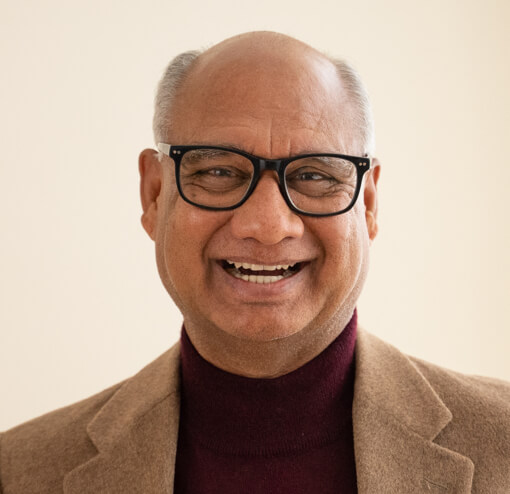People the world over have different reasons for believing that Swami Rama was a great master. In most cases it is because of the miracles he performed. He took someone’s chickenpox on himself, for example, or brought down a fever simply by sprinkling water on the patient. Or through his blessings a businessman prospered or someone’s father survived what should have been a fatal accident. Or sometimes through a simple touch or gaze he would transmit such incredible spiritual energy that a student would go into a trance, remaining in that state for hours. Or he would create a tumor in his own thigh, later dissolving it at will, or make a blister on someone’s hand disappear in a flash.
To me such incidents are not valid grounds for considering someone a master. Before meeting Swamiji I had known yogis who could walk on water, play two flutes at once (one through each nostril), kill a rooster by slicing a lemon, materialize a crystal Shiva lingam from thin air, or predict future events well in advance. But I also found that many such “accomplished” people had little or no interest in spirituality and were as miserable as those who were totally immersed in worldly affairs.
In Swamiji I saw the perfect sage, brimming with love and compassion—as well as a disciplinarian who tolerated no nonsense. He was a person of unmatched generosity—when involved in an act of charity, he saw no limit—but as the head of a charitable organization, he negotiated down to the last penny. More than once I saw him set in motion the wild dance of the forces of construction and destruction and then simply witness it from a distance. Institutions grew around him—and fell apart. Followers flocked to him with gifts and garlands—and abandoned him in disappointment and anger. In all situations I saw him cheerfully embracing gain and loss, honor and insult, with perfect equanimity. Every aspect of his life was full of extremes and contrasts, and yet to those who knew him intimately he was a simple man.
“He was a master because he lived in the world and yet remained above it.”
To me Swamiji is a master not because he had lots of students and followers but because he was master of himself and his surroundings. During the last 40 years of his life he did not sleep for more than two hours a day, and yet he was so energetic that no one could keep up with him for long. The people who worked with him worked in shifts. A peaceful yet forceful energy filled the space around him; sloth and inertia could not withstand it. Fully grounded within, he could attend to 10 tasks at a time with perfect precision and mastery. While he was dictating a book, he could shout at a contractor on the telephone and sip his tea with no sign of disturbance on his face.
He was a master because he lived in the world and yet remained above it. He was always in charge of himself and the world around him. He was at once cool like the moon and hot like fire. He was exceedingly kind to those who studied with him and practiced under his supervision while keeping their distance, but very hard on those who wished to be close to him and carry on his mission. He was a cyclone making everything swirl around him as he sat quietly in the eye of the storm, watching to see who had the strength and insight to face the tempest.

When he lived in the Himalayas and secluded places in other parts of India, hardly anyone saw him. He was a hermit who spent his nights meditating in the Himalayan caves; villagers came to him with milk and food, seeking nothing other than the unspoken name of God that filled the space around him.
Swamiji had a masterly way of hiding himself. As soon as he began his work in the world he drew such a thick veil around his true identity that only a few could see it. He lived in the bustling cities of New Delhi, Tokyo, and Chicago, surrounded by politicians and businessmen. Villagers could no longer reach him. People came with garlands, fruit baskets, and bundles of money. Some sought his blessings to win elections, others to ensure their prosperity and progeny. Spiritual seekers who had heard of him but had not known where to find him could now ring him in the hotel and schedule an audience.
Yet even while playing the role of a five-star-hotel swami he constantly attended the Lord of Life within. At midnight he took off his worldly mask and assumed his true identity: the sleepless Himalayan master. When he lived in the West he kept an extremely busy schedule, but deep down he remained the sleepless envoy of the Himalayan sages.
There have been many great masters who shine brilliantly. Swami Rama stands out among them not because he had more knowledge or spiritual power than others but because the saga of his life is similar to our own. He was a lively and curious child—he made mischief and got into trouble, just as all youngsters do. As a spiritual seeker he fought with his master, ignored his instructions, and thought of running away. There were times when he was so entangled in the world that only his master could rescue him. And like all of us, he went through rough periods in his life. He became an orphan while still a young child, was discarded by his own brother and looked after by a saint who owned nothing. Yet he managed to go to school, find time for spiritual practices, cultivate self-respect, conquer adverse conditions, and prove that through persistent practice one can become perfect.
“Once you conquer your mind, you have conquered the world. Once you have found joy and beauty within, the whole world becomes infused with joy and beauty.”
Swamiji’s life tells us that once you offer yourself to the Almighty Lord, the world naturally prostrates at your feet. Once you conquer your mind, you have conquered the world. Once you have found joy and beauty within, the whole world becomes infused with joy and beauty. Once you are successful inside, external success is yours. Once you surrender your desires to the Almighty, you are free of your personal whims and ambitions. Then the divine will itself becomes your desire. Swamiji’s life story shows us how to discover the connection between ourselves and the Divine; how to surrender our personal desire to divine will; how to unfold our potential to its fullest; how to be successful in the world without losing sight of the higher purpose and meaning of life.
Swamiji’s life was his message: “You are a child of the Divine and you have infinite potential to become and to be anything you wish.” He knew—as all sages know—that for those who understand this message, there is no fear left on Earth.
Source: At the Eleventh Hour by Pandit Rajmani Tigunait

